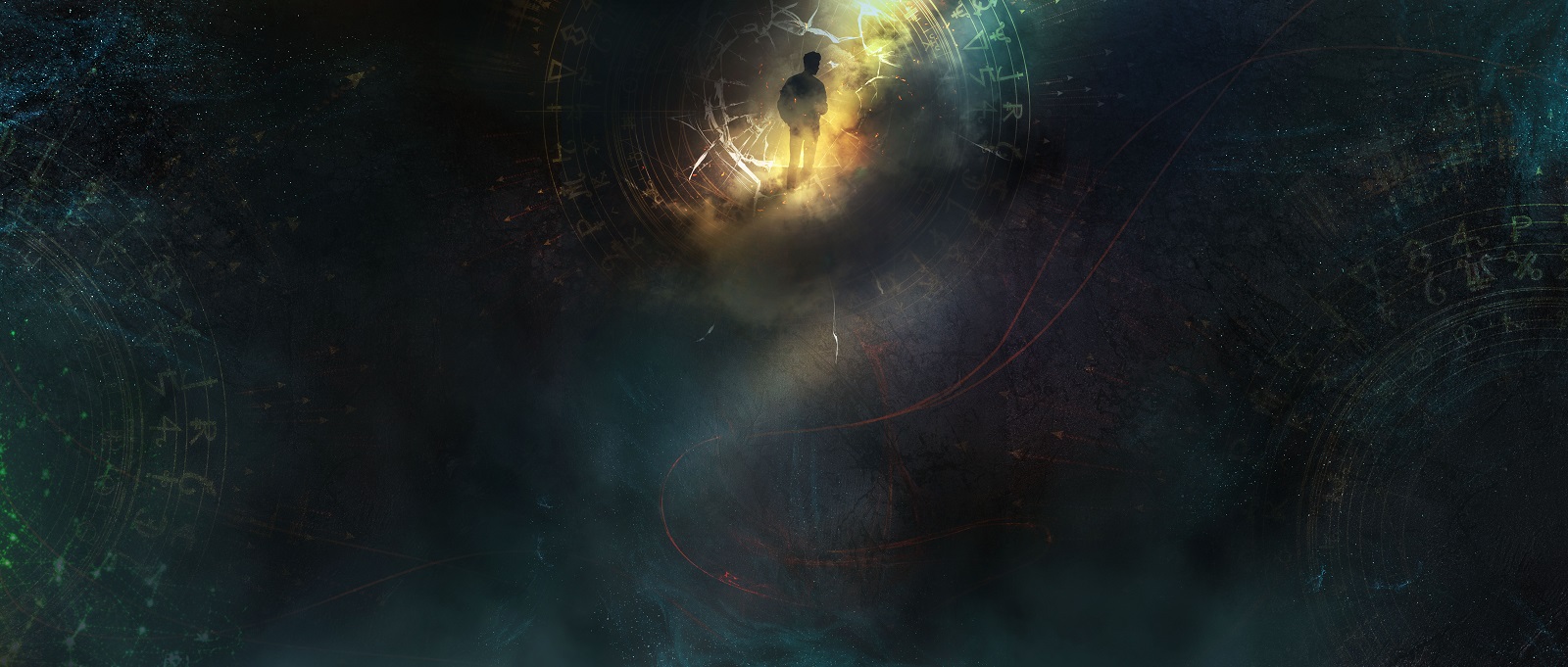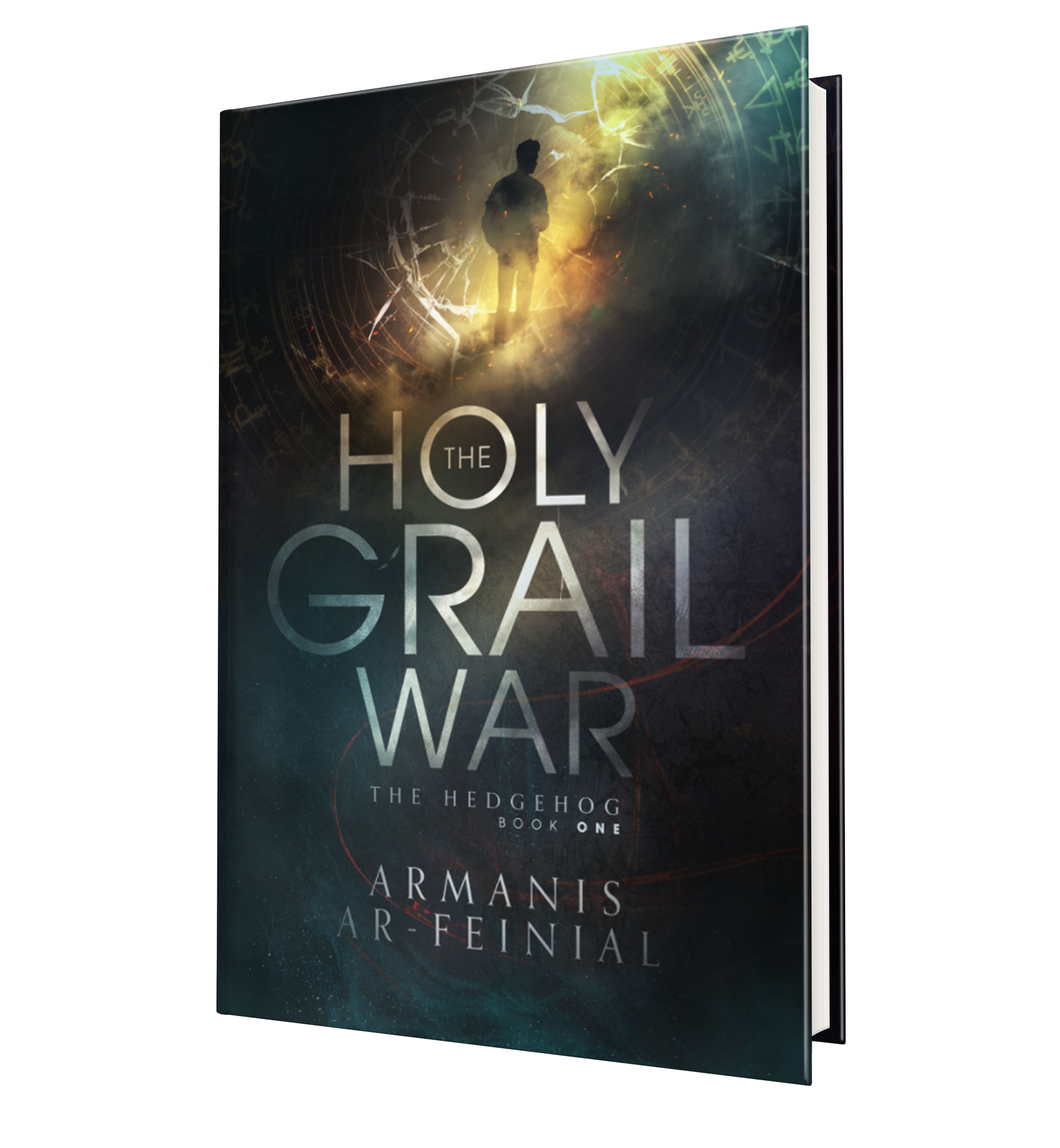Hello readers! Earlier in September, Tellest had the wonderful opportunity to promote the work of the ever-productive grimdark fantasy author, Armanis Ar-feinial. He had just recently launched his latest book, an urban fantasy thriller called The Holy Grail War: The Hedgehog, which effortlessly blends a handful of genres and subgenres. I had an even greater opportunity in being able to interview the author and try to gain some insight into his thoughts and his processes. Read on to learn more about Armanis Ar-feinial.
Tellest: Greetings Armanis! You’ve got a nice back catalog of books that you’ve worked on as a self-proclaimed practicing writaholic, so I know you’re taking time out of your passions to speak to me about what you’ve accomplished thus far, and what goes on behind the curtains. I wanted to thank you for giving us that look and the opportunity to learn more about you.
Armanis Ar-feinal: Thank you so much for having me, it’s a pleasure.
T: I always like to start off my interviews with a question that could ease readers into your world, or completely inundate them all things Armanis. What inspires you to write? Was it a person in your life, or an author that you grew to love?
AA: Honestly, each story has different inspirations. I wrote my fantasy series, which is due to be relaunched about this time next year, as a love letter not to fantasy, but to the Lord of the Rings. As far as the Holy Grail War, the initial inspiration fell out of my love for a game I’m no longer speaking the name of, and one of their tales. Originally it was meant to be a way to get the bad guys to admit to their guilt before administering justice. I stopped writing that and came back after being exposed to Violet Evergarden, and I scrapped the original project and started from scratch to write something I am exponentially prouder of.
T: I’m reading here that you spend a tremendous amount of your time with your books. As someone who has also gone back to the well, so to speak, it can feel arduous to rewrite the same content a second or third time, but it also feels incredibly fulfilling to tell the story with new insight and writing prowess. How do you tackle the process of restarting or rebooting?
AA: Ultimately, it depends. Sometimes you need to do a rewrite after not looking at the damned thing for years now, and the result is always better than when you started because you’ve had some time to find your voice. I am not a much more character driven writer, than someone who focuses on plot, but I don’t ignore that crucial aspect of the story telling.
T: The Holy Grail War feels very much like a world-hopping, artifact-scouring thriller with some fantasy elements thrown in for good measure. When you knew that you were going down that route, what drove you and motivated you?
AA: The Holy Grail War is, in fact, a genre bender. It didn’t start out that way. The initial draft had absolutely no fantastical elements in it, save for maybe one scene, and very, very briefly. I made a business decision with this, as there are many writers of fiction that, if you get them into a series of sorts, are put off on magic. I didn’t want to run the risk of alienating a reader because of some nuance like that; however, chapters were added to add more mystery to the world, more magic to the world, which is our own, and to reduce the risk of unnecessary drop out from the potential readership. A lot of what drove me, is how can I make this unique and not some other Dresden Files or Harry Potter knock off. There is some grit, mystery, action, thriller, literary, fantasy, and I guess historical fiction… That last one is definitely used more loosely than the rest.
T: I had a hard time labeling The Holy Grail War because of all that is possible with it. I think I landed on Urban Fantasy, because it certainly has those elements. Even if it didn’t play with magic, it looks at bringing a historical artifact that’s always been closely linked with fantasy into play. It could have been an Indiana Jones or Davinci Code sort of story, but you certainly make it your own with the more magical elements. Does leaning into that affect the eventual follow-ups to this first book in the series?
AA: I think Urban Fantasy is the best identifier to it, if just the setting alone. It takes place in our world, our time frame, modern events. Etc. Even the history, more or less, is the same. The history you and I know, is the same history the rest of the world knows. What might be different are the motivations of why certain things happened. There is a misconception that there is a grand syndicate that wants money and is working behind the scenes to get countries to do that for them, through war. There is a Syndicate, called the Caster’s Administration, but they are benign, and very secretive. Their main goal is to protect humanity from the threckets, which also includes protecting Creation as a whole, as the Threads of Creation is tied directly to knowledge, which they have.
T: While we can certainly explore them in traditional fantasy, urban and military fantasy offers a little more emphasis on realistic themes like PTSD. Did you find that more challenging than the relative freedom you have exploring a world from the ground up in your older fantasies?
AA: I wouldn’t say I had experience with PTSD, but I did do a number of research projects on the subject, and as someone who wanted to serve but couldn’t due to a…complicated, but let’s call it a misdiagnosed record. That’s the closest thing I can think of. But I do have some experience with isolation, depression, and after being exposed to a history of mental illness—not my own—I was able to tell the story quite freely. Honestly, for me, the hardest part, sometimes, was to keep going. Not because it was hard to write, but because the feelings of these characters were raw, real, and full of heart. To me, when writing this story, it constantly reminded that, while this is a fictitious story, it is too similar to people we might run into on the street. I have literally wept over my keyboard during editing and the writing of certain chapters in this book.
T: When you were writing this story, did you have a grand sense of where the stories were going, and what the backstories of some of your characters were, or was there some level of surprise as you continued in either direction?
AA: At first, no. Haha. There was a character who was meant to be a side character, someone of minimal importance, and she decided she wants a story to tell. Therefore, I told it. She took up pages of my time, but the result was exponentially better and I’m glad she came to life. Jennifer, she took control of the story for quite some time, and she wasn’t meant to.
T: We talked about rewrites earlier as well. Did you find any new surprises when you were rewriting, or was the process mostly streamlined? And I suppose that begs the question, do you feel like you’re creating the story, or discovering it?
AA: The process was definitely streamlined. However, the notices I took was some emphasis on character development and omitting a lot of repeated information.
T: Grimdark is your fantasy subgenre of choice, but you seem flexible enough to make a lot of different styles work, even beyond fantasy. Have you ever considered something outside of that realm, like science fiction?
AA: Science Fiction has its appeal, but I don’t much care for science fiction books. I’d prefer to watch the movies. I don’t want to get a PHD in fictional technology, if you get my meaning. With that said, it wouldn’t be above me to not write science fiction. In middle school, I wrote a gritty collection of short stories inspired by StarFox! My teacher hated it. Looking back on it, yeah, probably not that great, but I was 14!
T: Before there was The Holy Grail War: The Hedgehog, there were other fantasy books and worlds that you dove into. I’m correct in identifying a completely trilogy in The Falling, yes? Would you say that trio of books has neatly ended, or does it have the possibility of continuing in different directions?
AA: Oh, haha, that’s not finished. The trilogy part is being relaunched, and has slowed my writing process for that, but that series is far from over.
T: You mentioned earlier that one of your earliest stories followed anthropomorphized characters (in a sci-fi setting), and your earlier fantasy trilogy featured a half-elf in the lead role. What races do you most enjoy exploring, and why do you think that is?
AA: Correction, it was a wood elf who was in the lead role. I think, with that particular project, I just enjoyed telling the story, and creating some cultural aspect of them that made them unique. I love elves. Always have. Those beautiful, sexy pointy ears. I want them!
T: My mistake regarding the race. I’ve been jumping into everyone’s worlds lately, and it’s hard to keep track of everything! In your case, you’ve got multiple worlds that you’re building at the same time. Is it a challenge to keep things separated from each other?
AA: I keep detailed notes on my computer to keep things separated. I also do some internal roleplay in my head for brain storming, specifically to stay in the writing mode constantly.
T: Now that you’ve dipped your toes in a couple different sub-genres of fantasy, do you have a preference, or do you like to balance between what you’ve worked on?
AA: I’d say I am adopting the grimdark tones more in my writing and delving in quite a bit with nihilistic tendencies. Like Mother Russia! I like the balance, and I’m brainstorming another epic, which I am slowly working on now. It would be no mistake to say I’m planning on The Holy Grail War to by my masterpiece, and my overwhelming passion story.
T: Do you see The Holy Grail War as a trilogy, or is it possibly a sort of James Bond or Jack Ryan-esque ongoing series that could progress forever?
AA: One of the reasons I chose to self-publish this novel, is because I have no idea how long it’s going to be. It will take years, and there is going to be a lot of moving around. Not a trilogy at all, I’m guesstimating it could be longer than the Wheel of Time.
T: With as much exposure and experience as you have with writing and self-publishing, do you run into any challenges, or have you mostly ironed out the wrinkles of the creative process?
AA: Well, I’d say marketing is always the challenge. As writers, and as most writers will tell you, they hate that part. You have to meet these things called people, terribly dreadful creatures. Writers, almost like an unofficial rule, are introverts. I’m a bit more social than others, but meeting new people isn’t something writers generally like doing. Exceptions, but like I said, it’s an unofficial rule. I think I’ve got the self-publishing stuff down, the creative process of writing down, and we’ll see if I’ve learned enough about the marketing part soon.
T: You’ve been at it for a while, and you’ve accomplished a lot in your writing journey. Is there any advice that you could give to any would-be storytellers who are nervous about setting pencil to page for the first time?
AA: You potentially could be asking the wrong guy about this. You see, there are only three rules when it comes to storytelling. Unfortunately, nobody knows what they are. And that remains true. There is one thing I would like to address though, and that is the originality of story. There are storytellers who want to take a story to pen and paper, with a lot of sensitivities in mind, and as such, will go out of their way to avoid making such stories, watering down the themes, as it were. My suggestion is to keep mind of the sensitive content you’re writing, whether that be about sexual assault, human trafficking, lgbtqa+ or other marginalized groups, but don’t let those steer your story. I have read books, that, I can tell the author didn’t write, but the author let those sensitive discussions, or lack thereof decide how the story was going to go, what they were going to include. There are writers out there that will go out of their way to not be offensive, and while there is some merit to that, I am all for being offensive, but not needlessly offensive. Tell the story YOU want to tell. Don’t let anyone else write it for you. And there is consequence for that. So for me, if you end up writing a 15-novel epic fantasy story with all these nuanced characters, and if you start exploring a certain theme, and water it down, I will know, but I will not bother with the rest of the series because I feel personally, that I’m being cheated, and that you aren’t representing the theme as it deserves to be represented.
T: Thank you again for spending some time with us today, Armanis. I hope that as your other books come out, you’ll let us know so that we can spread the word.
If a reader wanted to learn more about you and the worlds that you create, where could they find you on the web?
AA: I am very social and active on twitter. You can find me at sarcastic_elf. I will be operating a discord at some point in the future, but most of what anyone would need to find will by on my twitter.
T: Thank you once again to Armanis Al-feinial for sharing his time, and letting us into his world. It’s clear that he’s working diligently and with much devotion on his fantasy worlds. It is Tellest’s recommendation that you look at all of Al-feinial’s work, but if you’re just getting started, why not check out the first book in his new series? Check out The Holy Grail War: The Hedgehog on Amazon today!
Michael DeAngelo
Latest posts by Michael DeAngelo (see all)
- Fantasy Promo – Quinine - July 25, 2024
- Sigil Art – Grim’s Hold - July 24, 2024
- Fantasy Promo – Light the Shadows (Under Elfhame’s Stars) - July 24, 2024






